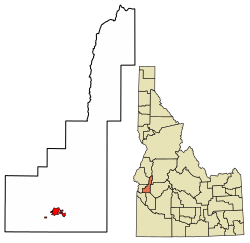Emmett, ID
| Emmett, Idaho | |
|---|---|
| City | |

View of Emmett
|
|
 Location of Emmett in Gem County, Idaho. |
|
| Coordinates: 43°52′22″N 116°29′42″W / 43.87278°N 116.49500°WCoordinates: 43°52′22″N 116°29′42″W / 43.87278°N 116.49500°W | |
| Country | United States |
| State | Idaho |
| County | Gem |
| Area | |
| • Total | 2.83 sq mi (7.34 km2) |
| • Land | 2.81 sq mi (7.28 km2) |
| • Water | 0.02 sq mi (0.06 km2) |
| Elevation | 2,362 ft (720 m) |
| Population (2010) | |
| • Total | 6,557 |
| • Estimate (2016) | 6,717 |
| • Density | 2,390.39/sq mi (922.91/km2) |
| Time zone | Mountain (MST) (UTC-7) |
| • Summer (DST) | MDT (UTC-6) |
| ZIP code | 83617 |
| Area code(s) | 208 |
| FIPS code | 16-25570 |
| GNIS feature ID | 0397688 |
| Website | www |
Emmett is a city in Gem County, Idaho, United States. The population was 6,557 at the 2010 census, up from 5,490 in 2000. It is the county seat and the only city in the county. Emmett is part of the Boise−Nampa, Idaho Metropolitan Statistical Area.
Rising some 5,906 feet (1,800 m) above sea level, Squaw Butte, named by Native Americans who used this area as their winter resort, stands at the north end of the valley. The Payette River was named after Francois Payette, a fur trader from Quebec who was put in charge of old Fort Boise in 1818 and traveled through the area. Permanent settlement began in the early 1860s, after gold discoveries in the Boise Basin brought people over the established stage and pack train routes. Two of these trails joined at the Payette River north of the present river bridge in Emmett.
Originally called "Emmettville," it was primarily a post office named after Emmett Cahalan, the son of Tom Cahalan, an early settler of the area. The post office was later moved but retained the name. A few years later the "ville" was dropped and the post office and town became simply Emmett. In 1883 James Wardwell had the town platted, and in 1900 the town was incorporated as Emmett. Later, in March 1902, the Idaho Northern railroad came to the valley.
After the closing of the mines in 1906, the power lines were extended to Emmett. A series of irrigation projects made it possible for more rapid expansion of the town as the major service center for a farming and fruit-growing valley. In the early 1900s fruit packers adopted the label of "Gem of Plenty" because of the fertility of the valley. During the mining era the valley was known as the "garden" for the mining regions.
...
Wikipedia

